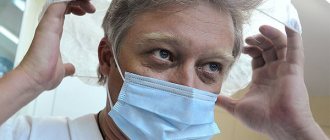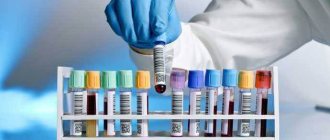A vascular surgeon is a doctor who treats vascular diseases through surgery. Consultation with a vascular surgeon is necessary if there are signs of circulatory disorders in various areas of the body. Most often this is gangrene of the extremities, cerebral circulatory disorders (stroke and transient disorders), palpable pulsating formations in various parts of the body, trophic ulcers on the legs or arms. All these diseases without treatment lead to life-threatening complications, and most often to premature death. Therefore, angiosurgeon is a very important medical specialty, created for the diagnosis and treatment of many human diseases. Angiosurgeons are usually called doctors who deal with the pathology of arteries, and phlebologists - the pathology of veins. The work of vascular surgeons results in relief from painful suffering associated with vascular damage. Our center has succeeded in treating vascular pathology, as evidenced by numerous reviews from healed patients.
Appointment with a vascular surgeon (angiosurgeon) - examination by a specialist of patients with suspected vascular diseases of the arteries and veins of the lower extremities, spider veins and aneurysms. The diagnostic “road map” involves a general medical examination, determination of arterial pulsation at standard points, auscultation of blood vessels, and assessment of the blood supply to the extremities. Based on the consultation data, additional examinations can be prescribed and a treatment plan can be proposed.
How is an appointment with a vascular surgeon at the Innovative Vascular Center?
The doctor accepts by appointment. The initial appointment with a vascular surgeon requires special preparation for the patient. To facilitate the work of the angiosurgeon, the data from studies of the vascular system that you have undergone previously will help. Try to bring with you to your consultation extracts from other hospitals where you were treated for this disease. It is advisable to take with you the data of ultrasound examinations, MSCT or angiography disks. If you are going to a consultation with a vascular surgeon for a relative based on documents, be sure to bring with you photographs of the sore leg and a video interview with the relative:
- What worries him
- When he got sick
- Has he tried treatment and what medications is he taking?
- Medical extracts and records from outpatient records
- The price of a consultation based on documents is lower than a face-to-face consultation, but there is much less information for making a decision, so try to take the patient to a doctor.
A consultation with a cardiovascular surgeon begins with interviewing the patient and examining complaints. If there are complaints of pain in the lower extremities, their nature is clarified, whether they appear when walking or are present at rest; if there is a history of ischemic stroke, the symptoms that preceded it are clarified (dizziness, loss of consciousness, noise in the head). It is imperative to find out whether there is pain in the abdomen and behind the sternum, to exclude serious vascular pathology. The best way to study the medical history is to bring the patient’s outpatient card with all the notes and examinations preceding the visit to the vascular surgeon.
After the interview, a general examination is carried out. The neck area, abdominal wall, groin and popliteal areas must be examined. Attention is drawn to the presence of a pulsating protrusion. The feet and hands are examined, their color, vein fullness, and skin temperature are assessed. Visible saphenous veins are assessed and their consolidation is noted. The volume of active and passive movements in the large joints of the limbs must be determined. After the examination, the doctor begins palpation. The main task is to feel the pulse at standard points, identify pulsating protrusions that may indicate aneurysms, the presence of compactions along the veins and muscle density. The absence of a pulse at any standard points may indicate a violation of the patency of the arteries above this point. The central and peripheral arteries are carefully examined.
Auscultation (listening) of the arteries is carried out at standard points. On the neck in the projection of the carotid arteries, in the axillary fossae, in the groin areas, in the navel area and in the popliteal fossa area. The presence of noise over these areas may indicate atherosclerotic narrowings or the presence of aneurysms. After consultation, to clarify the diagnosis, the cardiovascular surgeon prescribes additional examination methods.
The best bariatric surgeons. How to choose?
Is it possible to choose a clinic in another city?
Patients come to us from all regions of Russia, from the CIS countries, Europe, and Asia. Of course, it’s convenient when the surgeon lives in the same city with you. But since we are talking about people’s health and lives, this is not the main selection criterion. The most important thing is the qualifications of the surgeon and the equipment of the clinic.
Bariatric surgery is quite easily tolerated by patients and does not impose any restrictions on postoperative movements. You can safely fly by plane or travel by train. This will not cause any additional inconvenience.
Moreover, in our age of information technology, it is not difficult to maintain communication at a distance. If necessary, we use our extensive contacts. Our friends and fellow surgeons work in almost any major city and, with proper instruction, they can solve any problem.
If you decide to have surgery abroad, you should know. There are tens of thousands of bariatric surgeons in the world. The operations are carried out mainly at the expense of health insurance, so they are very expensive (about $20,000), and there is a waiting list for each surgeon (you have to wait a year or even more for the operation). Due to the specifics of medical insurance in a particular country, you may not have the operation that suits you, but the one that the surgeon knows how to do, and he knows how to do what the insurance allows. For example, in the USA very few gastric bypass procedures are performed; they mostly do gastroplasty. In Europe the picture is the opposite.
What requirements must the best bariatric surgeons meet?
We have already talked about the importance of the surgeon’s experience and qualifications. Now let's talk about how to understand which surgeon you should trust with your health and future?
1. Read reviews of the bariatric surgeon online. Watch videos of real bariatric patients. There are many resources where patients leave their reviews of clinics and doctors. However, be careful. There is not a single doctor in the world who does not have dissatisfied patients, and it is these patients who, for obvious reasons, are very active online.
In our work we adhere to the rule: The main thing is not the mistake, the main thing is the reaction to the mistake. Anyone can make a mistake, but not everyone can admit it and do everything possible to correct it.
2. There is a rule all over the world. A surgeon can be considered a bariatric specialist if he performs at least 50 bariatric surgeries per year . Unfortunately, so far in our country only a few meet this criterion. Most members of the Society of Bariatric Surgeons of Russia work in general surgical hospitals, performing operations in various fields, and bariatric surgery occupies only a small fraction of these operations.
A professional is one who is focused on one direction and, day after day, as part of an experienced team that understands each other perfectly, improves his skills. For example, our surgeons ]Vladimir Evdoshenko[/anchor] and Vadim Fedenko always work in pairs and perform 500-800 bariatric operations annually for 21 years!
3. Laparoscopic access. In the 21st century, absolutely all bariatric surgeries should be performed laparoscopically, minimally invasive and easily tolerated by patients. Only such access can ensure the safety and effectiveness of the operation. If you are offered an open access operation (citing the complexity of the case, high weight, or something else), turn around and go to another surgeon.
Consultation with a vascular surgeon in Moscow
State vascular surgery centers and clinics are reluctant to deal with the problem of treating patients with critical ischemia and gangrene, especially focusing on “pure” vascular operations. By contacting a vascular surgeon in our center, you will receive a full conclusion about the possibility of saving a limb in case of gangrene and a referral for treatment to the hospital of the Innovative Vascular Center in the city of Klin, Moscow region. You can receive a complete diagnostic algorithm for vascular disease during a consultation with our vascular surgeons not only in Moscow, but also in our branches in Voronezh, Tver and Pskov.
Paid appointments are conducted by angiosurgeons of the Innovative Vascular Center, who devote themselves to treating patients with vascular diseases. During the examination, ultrasound diagnostics may be performed. In the postoperative period, the angiosurgeon monitors the healing process and adjusts treatment prescriptions. The best ways to make an appointment is to leave your phone number in the special form on this page for a call back. You can sign up directly from the website or by calling the administrator of our call center. Contact the doctor in advance by email [email protected] so that he can advise on the documents and coordinate an appointment depending on the availability of places in the clinic.
Signs of a good doctor
- He listens carefully and asks a lot.
Despite the abundance of modern high-tech diagnostic methods, the doctor still makes the first assumptions about a possible diagnosis during anamnesis collection - a conversation with the patient. Details matter, sometimes not obvious to a non-specialist.
For example, with osteoarthritis, night pain usually occurs in the first half of the night, and with rheumatoid arthritis - in the morning.
It is important how long ago the symptoms appeared, how they changed over time, when the manifestations of the disease intensified and when they weakened. Concomitant diseases that may have an atypical course are important. Therefore, the initial conversation between the doctor and the patient is normally long and detailed and cannot possibly fit into the ten minutes that are allotted for the entire appointment in public medical institutions.
- He does not brush aside the patient's problems.
“What do you want at your age” - you won’t hear that from a good doctor.
Yes, chronic pathologies accumulate with age. But both at twenty and at eighty, a person wants to have an acceptable quality of life. Likewise, a good doctor will not “attribute” a patient’s problems to excess weight. Yes, excess body weight is a risk factor for many joint problems, and your doctor will most likely tell you so. But it is obvious that the patient will not magically lose weight in the blink of an eye, so in any case he needs full-fledged diagnosis and treatment.
- He carefully examines the patient.
Examines the appearance of the joint, pain during palpation (palpation) or movements, checks whether the joint mobility is fully preserved.
For example, inflammatory processes are characterized by deformation and swelling of the joint, and with non-inflammatory lesions its shape is usually not changed.
- He prescribes any tests only after a conversation and examination of the patient.
Laboratory and instrumental studies are necessary to confirm (or refute) the doctor’s assumptions about the diagnosis - and for this you must first examine the patient “physically” - with the help of your eyes and hands.
- He explains.
The doctor can explain why he came to a particular conclusion at a level that the patient can understand. The explanation will be clear and logical. If a patient, without understanding, asks again about the meaning of a term, a good doctor is able to explain what it means.
True, perhaps the explanation will be much longer than the term itself.
In the same way, when prescribing treatment, a good doctor will tell you why he recommends certain remedies. If we are talking about an expensive original drug, the doctor can suggest more affordable generics of good quality (but sometimes, unfortunately, there are no alternatives).
- He is constantly learning.
If frames with certificates of additional training, certificates of participation in scientific conferences, symposiums, and so on hang on the wall of the office, this does not mean that the doctor is prone to narcissism. This means that he invests time and money in improving his level as a specialist.
How to find a good doctor
Unfortunately, now you cannot be sure that when you visit a randomly selected specialist, you will receive high-quality advice. It is best if someone you know can recommend a trusted specialist. But if this is not possible, you will have to spend time searching.
- Select a clinic. Look through the reviews, weed out institutions that are famous for “spinning” the patient into unnecessary examinations and procedures. A self-respecting specialist will not want to work in such conditions.
- View the profiles of doctors at the selected clinic. Pay attention to doctors with more than five years of experience in practical medicine. If the clinic’s website has information about the doctor’s additional training: completed advanced training courses, conferences, additional education, this is an additional “plus in the karma” of the selected doctor.
- Read the reviews. If a specialist’s communication style is very important to you, take this into account. But the main attention should be paid to professional qualities: diagnoses made, treatment prescribed.
- If possible, get contacts of patients who have already been treated by the chosen doctor and find out their impressions first-hand.
Finding a good doctor will take some time and effort. But it’s worth it: you’ll know for sure that you’ve chosen a specialist you trust. When the doctor and the patient are partners with a common goal: the patient’s health, treatment is much more successful.
Author of the article:
Vyacheslav Samoilov











